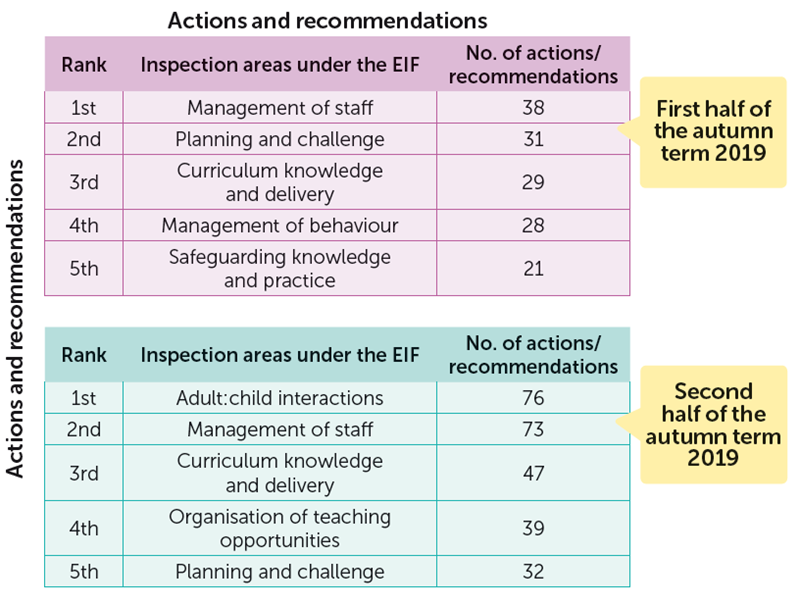Nursery Management: Inspection - In the frame
Pennie Akehurst
Monday, March 16, 2020
Pennie Akehurst, managing director of Early Years Fundamentals, discusses the changes she has seen in inspections since the advent of the new Education Inspection Framework

Irun a research company which focuses on analysing hundreds of Ofsted inspection reports each term so we can better understand the nature of the issues that lead to inadequate and RI outcomes.
We have been doing this for around three years and, until September 2019, similar issues would come up term after term. However, the data from the autumn term onward has started to show a very different picture.
When I spoke at the Nursery World Business Summit in November, I shared details of the emerging picture for the first 254 reports published since September. Our first set of analysis established that 82 per cent of providers had been able to achieve a Good or better inspection outcome.
Given that Ofsted figures from August 2019 show 96 per cent of settings achieved a Good or better inspection outcome, many will assume that there has been a massive drop, but this actually is not the case. Looking at the data more closely, we find this is an overview of the ‘overall effectiveness of active early years providers at their most recent inspection’. This means that some of the settings included in this figure won’t have been inspected for seven-plus years, or have had an inspection under the Common Inspection Framework.
Our data differs because it provides a picture of those inspected within a specific term or academic year, so it is as close to ‘live data’ as we can get. What we have seen over the past three years is that Good or better inspection outcomes tend to hover around 82-84 per cent – so, from our perspective, 82 per cent is a good position to be in given that this framework is now tougher.
Staying Outstanding
Nothing new is ever implemented with consistency, therefore instead of continuing to focus on the inspections that were published from September onward, we shifted our attention to reports that were published toward the end of the autumn term. This would give the new framework time to bed in.
In a matter of weeks we started to see a rise in the number of Good or better outcomes, the most staggering difference being the number of settings that achieved Outstanding, which rose from 9 per cent to 22 per cent in the second half of the autumn term. This took the number of Good and Outstanding combined to 87 per cent.
We mapped previous inspection grades against each setting’s most recent inspection outcome, which showed that although the number of Outstandings was on the rise, settings that previously held an Outstanding grade were finding it a struggle to maintain this outcome.
Only 18 settings were able to sustain their previous grade of Outstanding out of a possible 63 at the beginning of the autumn term.
This concern has been mirrored in the second half of the autumn term, as only 57 settings were able to stay Outstanding out of a possible 140. It looks as though the changes to the grading (which now requires settings to achieve all of the Good and Outstanding criteria securely and consistently) are starting to bite.
The real game-changer
The real impact can be seen in the actions and recommendations made by inspectors.
Over the past three years, we have compiled a list of the ‘top ten’ trending inspection issues each term. These are areas that appear with frequency within RI and ‘inadequate’ inspection reports. You can see the top five in the first table below where we found the vast majority of areas remained the same from one term to the next. However, in just one term we have seen a marked difference in Ofsted’s focus.

When the Common Inspection Framework was introduced in 2015, Ofsted placed a greater emphasis on what it is like to be a child in your setting or school, which resulted in a mixture of issues to do with both the welfare requirements and teaching and learning. Data from the new framework reflects the increase in the amount of time inspectors are spending observing what staff do, how they support the individual needs of children and the level of knowledge they have about where children are now and where they feel children should be headed next.
The top half of the second table below shows the issues that appeared with frequency in RI and ‘inadequate’ reports in the first half of the autumn term, while the bottom part presents the picture for the second half of the autumn term.

Let’s take a look at the actions and recommendations that we are seeing regularly under this new framework.
‘Adult:child interaction’ issues
- How staff are using questions to help children to think things through for themselves. How are children encouraged to find solutions to their problems, to unpick and investigate what is happening and why, and to develop their own plans?
- Giving children enough time to think about what has been asked, to respond and to articulate their own ideas and thoughts on the matter.
- Adults skillfully using questioning to explore what children know, understand and can do and then providing prompts, sharing thoughts, hypothesising (I wonder if…) and posing questions that enable learning to be extended.
Things to think about…
1. Do you spend enough time observing practice to know whether your practitioners skilfully use questioning to extend learning and to help children to become self-motivated learners? Do they ask questions that help them to better understand the child, or ask children things they already know the answer to?
2. Do you observe staff using new vocabulary naturally in conversation to build on what children know and understand?
3. Are you able to observe staff consistently encouraging the development of the Characteristics of Effective Learning so children can, for example, problem-solve for themselves and test their ideas?
‘Management of staff’ issues
Having monitoring arrangements that enable managers to understand where there are gaps in knowledge and practice and then putting a tailored programme of support in place which will raise the quality of teaching and learning.
Things to think about…
1. Do you vary your monitoring activities so that you have a rounded understanding of each practitioner’s strengths and areas for development?
2. Do you ensure that part of your conversation about performance focuses on things that will improve the quality of teaching and learning?
‘Curriculum knowledge and delivery’ issues
Staff need a good knowledge of the seven areas of learning to plan activities and environments that offer enough challenge, the biggest areas of concern being communication and language and maths.
Things to think about…
1. How do you know that staff have a good understanding of all seven areas of learning?
2. Have you had in-depth conversations about what training practitioners have accessed?
‘Organisation of teaching opportunities’ issues
The ability of staff to differentiate teaching to ensure all children receive appropriate support and challenge.
How larger group activities can be adapted to ensure all children are engaged and can concentrate.
Things to think about…
1. Have you looked at your routine lately and asked why each part is important and what value it adds? For example, are we sitting on a carpet talking about what the weather looks like outside instead of letting children experience it?
2. Do children show us they are bored or unengaged in parts of our routine? If so, why?
We will be publishing a more detailed report for the Ofsted Big Conversation in March.
Further information
Download Now



